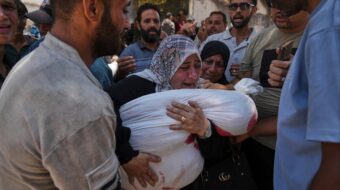“Imagine there’s no countries
It isn’t hard to do
Nothing to kill or die for
And no religion too
Imagine all the people
Living life in peace
You may say that I’m a dreamer
But I’m not the only one
I hope one day you’ll join us
And the world will be as one”
I wasn’t surprised to hear that the crew on the space shuttle Columbia enjoyed listening to John Lennon’s “Imagine.” Looking at our beautiful and fragile planet from space must evoke a deep feeling – a feeling that Imagine captures so poignantly – of the oneness of life and the overarching necessity of safeguarding world peace.
Earthlings like you and me don’t have the luxury that space travelers have. Our world, with all of its hustle and bustle, is close-up. Day-to-day problems are sometimes so overwhelming that they crowd out the larger picture.
And yet, despite all these everyday pressures, perhaps the most salient feature of the present situation is that millions of ordinary people across the length and breadth of our country sense that our planet is imperiled and are acting on that belief.
This awareness can be immediately traced to Sept. 11 and the ensuing and relentless drumbeats of war since then coming from the White House. At the same time, it has a longer genealogy stretching back to Truman’s decision to drop for the first and only time in human history atomic bombs on the defenseless cities of Hiroshima and Nagasaki.
And in the years that followed, this new awareness of the contingency of life in a nuclear world was sustained by Cold War tensions between the United States and the Soviet Union. During the 1980s, this sentiment was given a powerful impetus by the Reagan’s decision to develop and deploy more powerful nuclear weaponry.
The winding down of the Cold War and the collapse of the Soviet Union, however, brought a measure of relief to millions of people, but only momentarily. For with no state adversary capable of challenging U.S. imperialism’s ambitions of global domination and with the capture of the White House by the most reactionary section of our ruling class, the stage was set for a dangerous turn in world politics.
In the early going, the Bush administration acted with some measure of restraint, but since Sept. 11, foreign policy makers in the White House have pursued under the guise of fighting terrorism an adventurous course of action that relies on the use of overwhelming force, the deployment of nuclear weapons as weapons of first resort, and preemptive strikes.
People are understandably on edge about this and wonder where all this is going. Iraq today, where tomorrow? Not surprisingly, it has rekindled this very troubling concern that humanity might be marching to its oblivion.
In 20th century, the world was lucky to avoid a nuclear confrontation engulfing all of humanity. In this century, we may not be so lucky. The spread of weapons of mass destruction that are infinitely more powerful, the danger of war breaking out in one locality and quickly spreading to whole regions and continents, and, above all, the Bush’s pursuit of world empire “by any means necessary” increase the chances of a chilling doomsday scenario.
Thus, humankind needs both the political imagination to anticipate and act on the dangerous direction in which the world is moving before it’s too late, as well as the vision to construct new norms and institutions whose express purpose is to safeguard peace in an interdependent world.
Such a vision must rest on the firm belief that war is immoral and impermissible in this era and that life is precious and fragile. It must insist on the non-use of force in the settlement of international conflicts and the total elimination of weapons of mass destruction from our earth.
Of course, the realization of this vision begins with preventing U.S. military aggression against the Iraqi people. A war will bring almost unimaginable death and destruction – “Shock and Awe” is the Pentagon‘s euphemism for the 48 hours of massive bombing they are planning as the start of the war.
It will also heighten the terrorist danger to the extreme, exacerbate tensions in the Middle East, Koreas, and elsewhere, and raise exponentially the danger of war on a much wider scale and with even greater loss of life.
Bush has offered no justification for such aggression, and even if we assume for the moment – and it’s a dubious assumption – that everything that Powell said was true, it does not inescapably follow that military action is the answer. What does follow is the political and moral imperative to continue the inspection process, which for now is the firewall between war and peace.
A peaceful world is possible and a peaceful solution to the present crisis exists, but the peoples of the world have to impose it on the Bush administration. In doing so the world community will take an important step in the direction of constructing a new world order based on peace, equality, economic security, and sanity. Admittedly, it won’t be easy. Indeed, it will require the united and tireless efforts of peoples and nations across our precious and beautiful planet.
But as another musical genius, Louis Armstrong, sang, “What a wonderful world it could be.”
Sam Webb is the national chairman of the Communist Party USA and can be reached at swebb@cpusa.org
PDF version of ‘For a world without war, millions must imagine and act’









